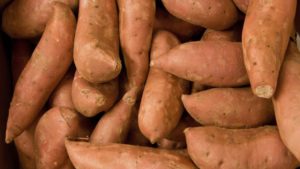Jan 10, 2023
Clemson researchers work to improve organic sweet potato production in SC
Organic farming continues to become more popular but offers South Carolina sweet potato farmers fewer options for controlling costly weeds and nematodes than do conventional farming methods.
To help give organic farmers new weapons to use against these pests, a team of Clemson University researchers have received a $747,280 grant from the United States Department of Agriculture National Institute of Food and Agriculture’s Organic Transitions Program.

The research focuses on using anaerobic soil disinfestation, novel plastic mulch and sweet potato clones to control southern root-knot nematode and weed infestations in organic sweet potato production.
“Our long-term goal is to develop an integrated management approach in organic sweet potato production that combines these techniques,” said Matthew Cutulle, project director and Clemson weed scientist stationed at the Coastal Research and Education Center in Charleston, South Carolina. “Our research, Extension and outreach activities will lead to effective management strategies to increase sweet potato production.”
Anaerobic soil disinfestation is a soil-borne disease management strategy proven effective against a wide range of pathogens in organically grown crops.
In this study, researchers will evaluate ASD on sweet potato germplasm by screening 20 sweet potato clones in an ASD environment. These will include plant introductions and commercial germplasm that have either a bunched-type growth habit or resistance to southern root-knot nematode, as well as commercial standards.
The impact of ASD with selected clones will be evaluated at the time of transplanting; one, two, and three weeks after transplanting; and after ASD termination. Scientists will study local carbon sources for their ability to reduce the extent and population density of SRKN and weeds in sweet potato fields will also be studied.
Plastic mulch helps modulate soil temperature, reduce soil erosion, evaporation, fertilizer leaching and weed problems, as well as increase quality and yields. During this study, researchers will evaluate the impact of novel plastic materials to control weeds. They also will integrate best practices of ASD, plastic material and improved sweet potato lines to determine impact on weed infestation and nematode suppression.
Clones used in this study have improved resistance to both the southern root-knot nematode and weed infestation.
This study will be conducted on farms, as well as at the Coastal Research and Education Center and the United States Vegetable Lab in Charleston.
Researchers will evaluate ASD impact on soil microbial dynamics in sweet potato production systems. They also will conduct a cost-return analysis of ASD used in combination with improved plastic mulch and novel sweet potato germplasm compared to currently used management practices and sweet potato cultivars. Results and guidelines will be given to stakeholders, scientists and industry professionals in the Southeast and other regions in the United States through Cooperative Extension Service agents and outreach programs.
Other Clemson researchers involved in this study titled, “Organic Transitions: Improving Profitability of Organic Sweet potato through Pest Resistant Clones and Enhanced Anaerobic Soil Disinfestation” are Brian Ward, Churamani Khanal, Puskar Khanal, Julia Kerrigan and R. Karthikeyan. The study ends on Aug. 31, 2025.
Sweet potatoes are highly nutritious and are a staple in many diets including baby food. Information from the USDA shows sweet potatoes are higher in beta carotene than many other vegetables and are a source of potassium, fiber, as well as vitamins A and C.
Per capita consumption of fresh sweet potatoes in 2021 in the United States was around 6.3 pounds. Sweet potato production in the United States reached an estimated $726.18 million in 2020.
Organic farming is environmentally friendly and is one of the fastest-growing sectors of American agriculture. However, costs involved are causing concern for producers. As part of this study, the researchers will provide a budget analysis to show how profits increase or decrease with the adoption of this alternative farming practice.
Other organic farming research conducted in the Clemson College of Agriculture, Forestry and Life Sciences includes a “Going Organic” when breeding pulse crops webinar series, organic vegetable production using carbon waste, multifunctional agriculture research in The Bottoms and more. For more information on organic farming research at Clemson, go to https://news.clemson.edu/?s=Organic+Farming.









